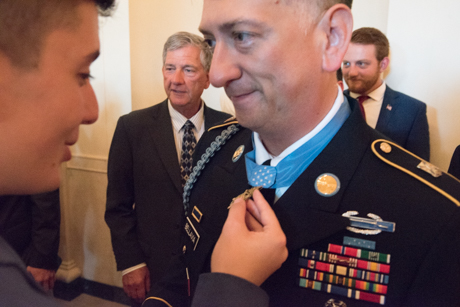
Story by Dylan Smith, editor and publisher of the Tucson Sentinel.
Photos by Howard Owens.
David Bellavia, a Batavia resident, on Tuesday, became the first living veteran of the Iraq War to receive the Medal of Honor, as President Donald Trump presented the award in a ceremony at the White House.
Trump said it was his "privilege to award the highest military honor to an American soldier who demonstrated exceptional courage to protect his men and defend our nation."
Bellavia was recognized for his valor in the Second Battle of Fallujah, a nearly two-month urban combat offensive in late 2004, in which more than 10,000 U.S. troops struggled to gain control of a dense city that had held some 350,000 people, but was then populated mostly by 3-4,000 heavily fortified insurgent forces.
Bellavia, now 43 years old, was a U.S. Army staff sergeant during that battle. On his 29th birthday, Nov. 10, 2004, his platoon was clearing a block of a dozen buildings that were occupied by Iraqi insurgents who were firing at U.S. troops.
"For three days straight, David and his men kicked down doors, searched houses, and destroyed enemy weapons, never knowing where they would find a terrorist lurking next. And there were plenty of them," Trump told a packed White House ceremony.
In presenting the nation's top military honor, Trump noted Bellavia's "extraordinary courage... selfless service... and carrying on the legacy of American valor."
During a house-to-house search, the soldiers of Company A, Task Force 2-2, 1st Infantry Division, encountered fierce resistance — a not unfamiliar situation for his unit; 37 people from his brigade died that year.
"A very dangerous operation," Trump said Tuesday. "They entered house after house, and secured nine of the buildings. Then came the 10th. That was a tough one. It was a three-story building surrounded by a nine-foot wall. As they entered the house and moved into the living room, two men were behind concrete barricades. They opened fire on David and everybody."
"In the dark of night, shards of glass, brick, and plaster flew into the air, wounding multiple soldiers. The rounds of fire ripped holes into the wall separating the Americans from the terrorists. The wall was ripped to shreds. David knew they had to get out. David thought that they had had it. He leaped into the torrent of bullets and fired back at the enemy without even thinking," the president said.
"He provided suppressive fire while his men evacuated, rescuing his entire squad at the risk of his own life. Only when his men were all out did David exit the building."
From the citation for Bellavia's Silver Star:
At this point, Sergeant Bellavia, armed with an M249 SAW gun, entered the room where the insurgents were located and sprayed the room with gunfire, forcing the jihadists to take cover and allowing the squad to move out into the street. Jihadists on the roof began firing at the squad, forcing them to take cover in a nearby building. Sergeant Bellavia then went back to the street and called in a Bradley Fighting Vehicle to shell the houses.
After this was done, he decided to reenter the building to determine whether the enemy fighters were still active. Seeing a jihadist loading an RPG launcher, Sergeant Bellavia gunned him down.
A second jihadist began firing as the soldier ran toward the kitchen and Bellavia fired back, wounding him in the shoulder. A third jihadist began yelling from the second floor. Sergeant Bellavia then entered the uncleared master bedroom and emptied gunfire into all the corners, at which point the wounded insurgent entered the room, yelling and firing his weapon.
Sergeant Bellavia fired back, killing the man. Sergeant Bellavia then came under fire from the insurgent upstairs and the staff sergeant returned the fire, killing the man.
At that point, a jihadist hiding in a wardrobe in a bedroom jumped out, firing wildly around the room and knocking over the wardrobe. As the man leaped over the bed he tripped and Sergeant Bellavia shot him several times, wounding but not killing him.
Another insurgent was yelling from upstairs, and the wounded jihadist escaped the bedroom and ran upstairs. Sergeant Bellavia pursued but slipped on the blood-soaked stairs. The wounded insurgent fired at him but missed. He followed the bloody tracks up the stairs to a room to the left. Hearing the wounded insurgent inside, he threw a fragmentary grenade into the room, sending the wounded jihadist onto the roof.
The insurgent fired his weapon in all directions until he ran out of ammunition. He then started back into the bedroom, which was rapidly filling with smoke. Hearing two other insurgents screaming from the third story of the building, Sergeant Bellavia put a choke hold on the wounded insurgent to keep him from giving away their position. The wounded jihadist then bit Sergeant Bellavia on the arm and smacked him in the face with the butt of his AK-47.
In the wild scuffle that followed, Sergeant Bellavia took out his knife and slit the jihadist's throat. Two other insurgents who were trying to come to their comrade's rescue fired at Bellavia, but he had slipped out of the room, which was now full of smoke and fire. Without warning, another insurgent dropped from the third story to the second-story roof.
Sergeant Bellavia fired at him, hitting him in the back and the legs and causing him to fall off the roof, dead. At this point, five members of 3rd Platoon entered the house and took control of the first floor. Before they would finish off the remaining jihadists, however, they were ordered to move out of the area because close air support had been called in by a nearby unit.
"Alone, in the dark, David killed four insurgents and seriously wounded the fifth, saving his soldiers and facing down the enemies of civilization," President Trump said at Tuesday's ceremony.
"Here with us today are 32 American service members who fought with David in Iraq, including 12 who were with David on that very, very horrible and dangerous November night."
Also present were eight previous recipients of the Medal of Honor, and five Gold Star families — relatives of Bellavia's brothers in arms who were killed in combat.
Bellavia was born in Albion and lives in Batavia. His father William died last year. His grandfather, Joseph Brunacini, age 99, was awarded a Bronze Star for his actions during the Normandy campaign in World War II, and was watching Tuesday's ceremony via video at his home in Jamestown, N.Y.
"America is blessed with the heroes and great people like Staff Sergeant Bellavia whose intrepid spirit and unwavering resolve defeats our enemies, protects our freedoms, and defends our great American flag," Trump said. "David, today we honor your extraordinary courage, we salute your selfless service, and we thank you for carrying on the legacy of American valor that has always made our blessed nation the strongest and mightiest anywhere in the world."
Medal of Honor citation:
The President of the United States of America, authorized by Act of Congress, March 3rd, 1863, has awarded in the name of Congress the Medal of Honor to Staff Sergeant David G. Bellavia, United States Army, for conspicuous gallantry and intrepidity at the risk of his life above and beyond the call of duty.
Staff Sergeant David G. Bellavia distinguished himself by acts of gallantry and intrepidity above and beyond the call of duty on November 10, 2004, while serving as squad leader in support of Operation Phantom Fury in Fallujah, Iraq.
While clearing a house, a squad from Staff Sergeant Bellavia’s platoon became trapped within a room by intense enemy fire coming from a fortified position under the stairs leading to the second floor. Recognizing the immediate severity of the situation, and with disregard for his own safety, Staff Sergeant Bellavia retrieved an automatic weapon and entered the doorway of the house to engage the insurgents.
With enemy rounds impacting around him, Staff Sergeant Bellavia fired at the enemy position at a cyclic rate, providing covering fire that allowed the squad to break contact and exit the house.
A Bradley Fighting Vehicle was brought forward to suppress the enemy; however, due to high walls surrounding the house, it could not fire directly at the enemy position. Staff Sergeant Bellavia then reentered the house and again came under intense enemy fire. He observed an enemy insurgent preparing to launch a rocket-propelled grenade at his platoon. Recognizing the grave danger the grenade posed to his fellow soldiers, Staff Sergeant Bellavia assaulted the enemy position, killing one insurgent and wounding another who ran to a different part of the house.
Staff Sergeant Bellavia, realizing he had an uncleared, darkened room to his back, moved to clear it. As he entered, an insurgent came down the stairs firing at him. Simultaneously, the previously wounded insurgent reemerged and engaged Staff Sergeant Bellavia. Staff Sergeant Bellavia, entering further into the darkened room, returned fire and eliminated both insurgents. Staff Sergeant Bellavia then received enemy fire from another insurgent emerging from a closet in the darkened room.
Exchanging gunfire, Staff Sergeant Bellavia pursued the enemy up the stairs and eliminated him. Now on the second floor, Staff Sergeant Bellavia moved to a door that opened onto the roof. At this point, a fifth insurgent leaped from the third-floor roof onto the second-floor roof. Staff Sergeant Bellavia engaged the insurgent through a window, wounding him in the back and legs, and caused him to fall off the roof.
Acting on instinct to save the members of his platoon from an imminent threat, Staff Sergeant Bellavia ultimately cleared an entire enemy-filled house, destroyed four insurgents, and badly wounded a fifth. Staff Sergeant Bellavia’s bravery, complete disregard for his own safety, and unselfish and courageous actions are in keeping with the finest traditions of military service and reflect great credit upon himself and the United States Army.
Bellavia, who has hosted a local radio talk show and run for office as a Republican, is the author of "House to House," which recounts his experiences in the Fallujah battle.
He left the Army in 2005, after six years of service. During his yearlong deployment in Iraq, his unit took part in the battles of Najaf, Mosul, Baqubah and Muqdadiyah, as well as the fight for Fallujah.
"Listen, you know I'm not going to pretend to write -- the narrative of the Iraq war is well established -- but the Iraq veteran has nothing to apologize for. The Iraq veteran has served with the same, in the finest traditions of any other generation at war," Bellavia said in an interview with The Batavian earlier this month.
"I can't tell you that looking back and seeing how a lot of people tend to look at the valor of a generation and say well are these good wars or bad wars. Iraq veterans are walking around with chips on their shoulder because they're regarded as part of the bad war, the war of choice, the war that was based on bad intelligence, and you know we're free to think and decide whatever you want," said Bellavia, who co-founded the advocacy group Vets for Freedom after he left the military.
"I think the narrative is written on that. But I would just caution us to not make the veteran feel the weight of that. I don't think it's their responsibility. Ninety-nine percent of these men and women served with honor and distinction and we really shouldn't have to apologize for where our nation sends us to fight."
"You know, I never saw the enemy as people. I think, now, when I have, when you have children, you think you know, obviously, you want your guys, America, the good guys, to be OK. But I also think back to, I don't want the enemy's children to take the road that their dads took. I don't want my kids to be fighting in conflicts with another generation," he said.
"What are the things that we can do, especially when it comes to acknowledging that a lot of people think that war guys, veteran guys are pro-war, that we love this. You know, we're pretty anti-war. I mean, I don't know of any veteran that you've talked to that is like, 'this is the greatest thing in the world,' " he said.
"We're violently anti-war but with the goal, the end state is that we won't do this anymore. I mean, if you would've told me that I would join the Army because my sons and daughter would also get to have this experience, I never would have done it. It's not worth it. You fight so that it stops here and it doesn't continue. And it would be heartbreaking to know that this is going to go on for another 25 years."
Bellavia's awards and decorations include: the Medal of Honor; Silver Star; Bronze Star; Army Commendation Medal with Oak Leaf Cluster; Army Achievement Medal with Oak Leaf Cluster; Army Good Conduct Medal with Bronze Clasp and two Loops; the National Defense Service Medal; Kosovo Campaign Medal with Bronze Service Star; New York State’s Conspicuous Service Cross; the Global War on Terrorism Expeditionary Medal; the Global War on Terrorism Service Medal; the Noncommissioned Officer Professional Development Ribbon with Numeral "2"; the Army Service Ribbon; Overseas Service Ribbon with Numeral "2"; the Presidential Unit Citation; Combat Infantryman Badge; Driver and Mechanics Badge; and the NATO Medal.
PUBLISHER'S NOTE: Dylan Smith is one of my local online news publishing colleagues. He knew how busy I have been in Washington, D.C., that he volunteered -- without being asked -- and wrote this story for The Batavian.
Top photo: David Bellavia's son, Aiden, examines the Medal of Honor around his father's neck during a reception at the White House following the awards ceremony.
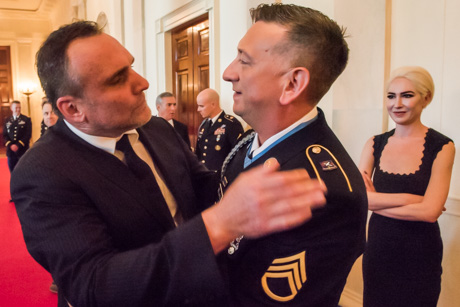
Bellavia and Michael Ware.
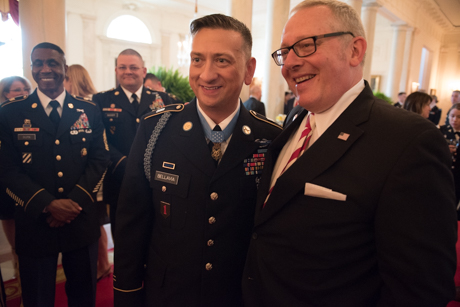
David Bellavia and longtime friend Michael Caputo.
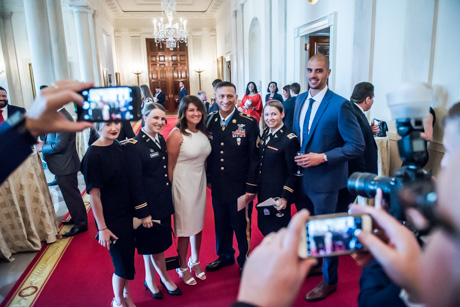
Congressman Chris Collins chatting with Michael Caputo.
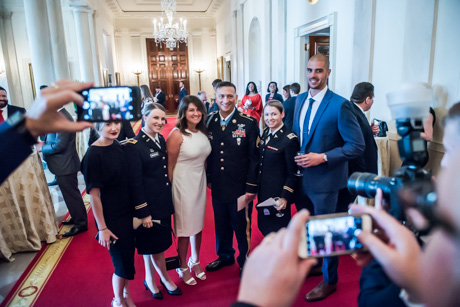
Michelle McCulloch, in the white dress, who is from Wyoming County, and her daughters and son-in-law.
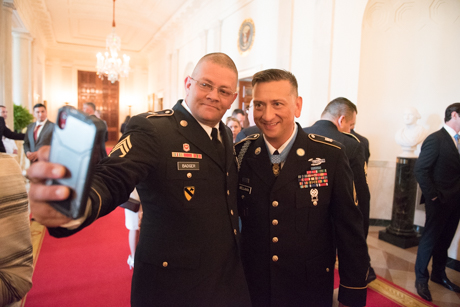
Sgt. John Badger takes a selfie with David Bellavia.
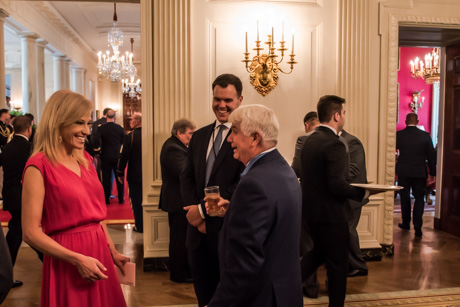
Kelly Ann Conway chats with Medal of Honor recipient James McCloughan.
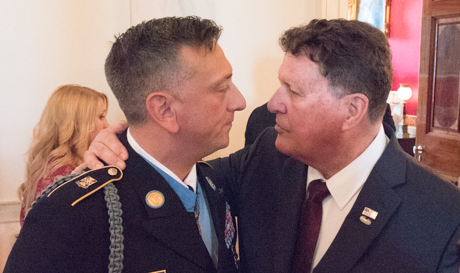
David Bellavia and Gen. Ken Chrosniak (retired).
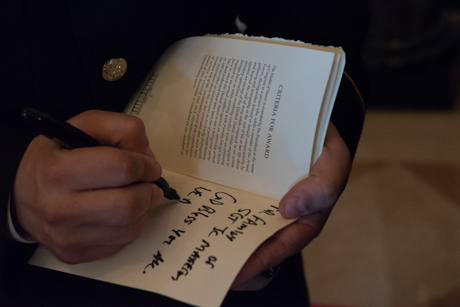
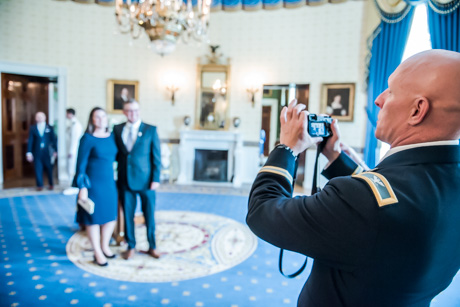
Col. Douglas Walter, Bellavia's second commander in Fallujah, takes a photo in the White House for some fellow guests.
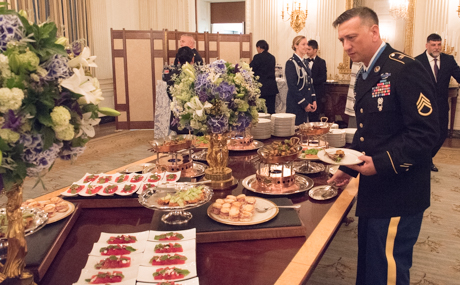
At the end of the reception, the buffet room was cleared of all guests and David finally had a chance to grab a bite to eat.
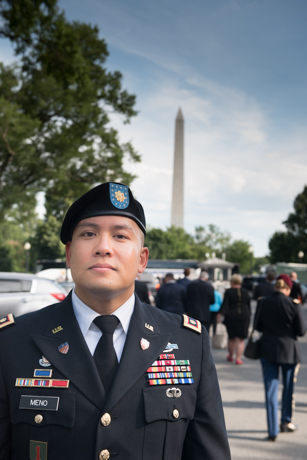
Maj. Joaquin Meno, who was a lieutenant in Iraq, and commander of Bellavia's platoon.
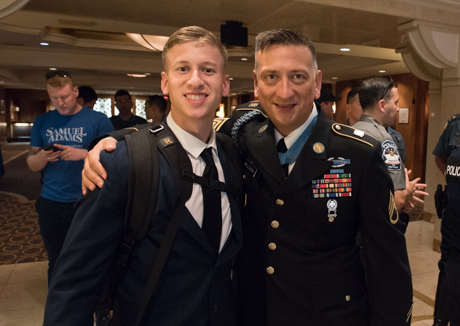
Military photographer Sgt. Kevin Roy with Bellavia. Roy has arguably been the hardest working man tasked to Medal of Honor support over these four days of ceremonies, events, and tours. His job has been to be at Bellavia's side constantly, taking hundreds of photos all day and then returning to his computer to process the photos before going bed every night.
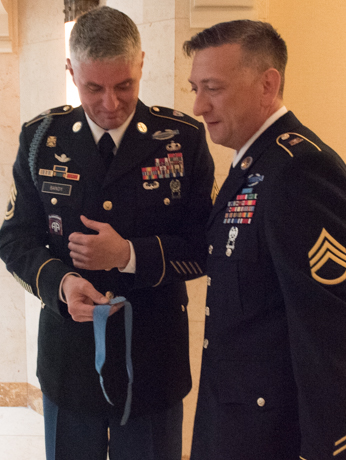
Sgt. John Bandy examines Bellavia's Medal of Honor after Bellavia and his guest returned to the hotel.
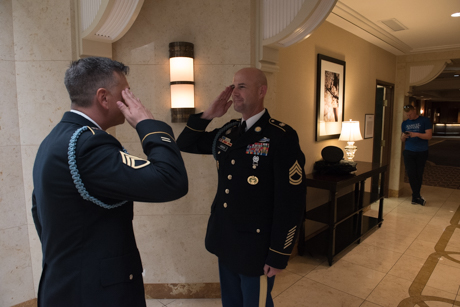
Sgt. Jonathan Gibson salutes David Bellavia.
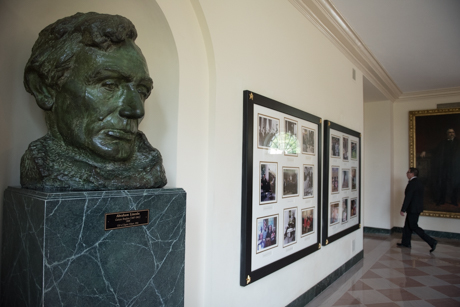
Lincoln's bust in the White House.
